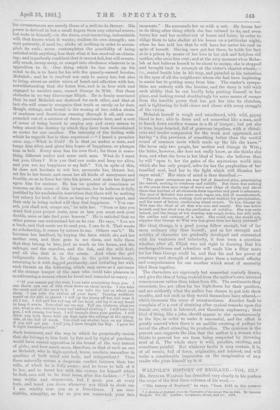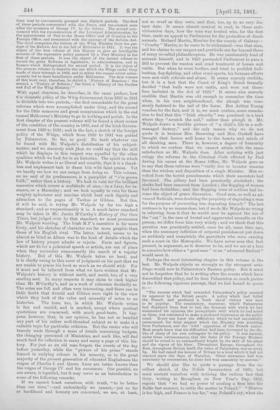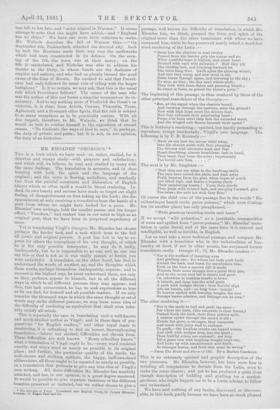WALPOLE'S HISTORY OP ENGLAND.—VOL. III.* Ma. SPENCER WaLroisE has described
very clearly in his preface the scope of the first three volumes of his work :— " The history of England," he says, "from 1815 to the present * A History otRoiasd,fOel C0111110011 rtf ahe Great War in MEN By Spenser Walpole, Vol. III. Loudon: Lononms, Geese, and Co. 1830. time may be conveniently grouped into distinct periods. The first of these periods commencei with the Peace, and ter.ninated soon :after the accession of George IV. to the throne. The second com- menced with the reconstruction of the Liverpool Administration, by the appointment of Peel to the Home Office and of Canning to the Foreign Office, and terminated with the passage of the Reform Act. The third comprises the history of the Whig Dlinistry from the pas- age of the Reform Act to the fall of Melbourne in 1811. It was the object of the first volume of this History to give an intelligible account of the repressive policy pursued by a Tory Ministry in the drat of these periods. It was the object of the second volume to record the great Reforms in legislation, in administration, and in finance which distinguished the second period. It is the object of the present volume to describe the use which the Whigs under Grey made of their triumph in 1882, and to relate the causes which subse- quently led to their humiliation under Melbourne. The first volume 'of this work may, therefore, be styled a History of Reaction ;' the second, a 'History of Reform ;' the third, a 'History of the Decline and Fall of the Whig Ministry.'" With equal clearness, he describes, in the same preface, bow Vie domestic policy of the Whig Government from 1833 to 1841
is divisible into two periods,—the first remarkable for the great reforms which were accomplished under Grey, and the second for the little measures and great compromises which in the end Tamed Melbourne's Ministry to go to nothing and perish. In the first chapter of the present volume will be found a short review of the condition of the country in 1833, and of the Irish Govern- ment from 1829 to 1832; and in the last, a sketch of the foreign policy of the Whigs, which from 1830 to 1841 was guided by Pahnerston. So far, so good. No fault whatever can be found with Mr. Walpole's distribution of his subject- matter, and we sincerely wish that we could say that the skill which he displays in this respect was equalled by the other qualities which we look for in an historian. The spirit in which Mr. Walpole writes is so liberal and sensible, that it is a thank- less and unpleasant task to damn him with faint praise. Yet we hardly see how we can escape from doing so. This volume, as we said of its predecessors, is a pamphlet of "o'er-grown bulk," rather than a history. We look in vain for the brilliant narrative which covers a multitude of sius,—in a Livy, for in- stance, or a Macaulay ; and we look equally in vain for those sveighty aphorisms and maxims which lend such dignity and attraction to the pages of Tacitus or Gibbon. But this, it will be said, is trying Mr. Walpole by far too high a standard ; and so unquestionably it is. A much fairer standard may be taken in Mr. Justin NI'Carthy's History of Oar Own Times, but judged even by that standard, we must pronounce Mr. Walpole wanting. The Irish M.P.'s narrative is far more lively, and his sketches of character are far more graphic than those of his English rival. The latter, indeed, scorns to be almost as blind as Alison was to the kind of details which the law of history proper admits or rejects. Facts and figures, which are fit for a polemical speech or article, are out of place when they encumber unnecessarily the march of a regular history. But of this Mr. Walpole takes no heed, and it is chiefly owing to this error of judgment on his part that we are unable to praise his book as much as we should wish. For it must not be inferred from what we have written that Mr. Walpole's history is without merit, and merit, too, of a very sterling sort. In many respects it may claim to rank higher than Mr. M'Carthy's, and as a work of reference decidedly so. The notes are full ancl, often very interesting, and there can be little doubt that Arnold and Gibbon were right in the view which they took of the value and necessity of notes to an historian. The tone, too, in which Mr. Walpole writes is fair and candid, and is marked, except where poetical quotations are concerned, with much good-taste. It hap- pens, however, that, in our opinion, he has not so handled any part of his rather well-threshed subject as to make it a suitable topic for particular criticism. But the reader who will bravely wade through a mass of details concerning budgets, the changing personnel of Ministries, and such like, will find much food for reflection in many and many a page of this his- tory. For just as an old man forgets the events of the day before yesterday, while the "picture of his prime" stands limned. in undying colours in his memory, so to the great majority of the present generation of educated Englishmen the reigns of Charles I. and Queen Anne are better known than the reigns of George IV. and his successors. Our parallel, we are aware, is lopsided, but it may serve as an introduction to some of the following remarks.
If we cannot boast ourselves, with truth, "to be better than our sires,"—aucl undoubtedly we cannot,—yet so far as hardihood and honesty are concerned, we are, at least, not so cruel as they were, and that, too, up to no very dis- tant date. It seems almost comical to read, in these anti- vivisection days, how the man was treated who, for the first time, made an appeal to Parliament for the protection of dumb animals. Riehard Martin, Member for the county of Galivay- " Cruelty " Martin, as he came to be nicknamed—was that man, and his claims to our respect and gratitude are far beyond those of many so-called philanthropists. He was passionately fond of animals himself, and in 1823 persuaded Parliament to pass a Bill to prevent the wanton and cruel treatment of horses and cattle. But when he went further, and tried. to prohibit bull- baiting, dog-fighting, and other cruel sports, his humane efforts were met with ridicule and abuse. It seems scarcely credible, but it is a fact that the Court of King's Bench formally decided "that bulls were not cattle, and were not there- fore included in the Act of 1823." It seems also scarcely credible that Martin was old enough to remember the time when, in his own neighbourhood, the plough was com- monly fastened to the tail of the horse. But Arthur Young vouches for the fact, and it is, we must confess, some consola- tion to find that this "Irish atrocity" was practised in a land where they "scratch the soil," rather than plough it. Mr. Walpole draws a terrible picture of "a child's life in a well- managed factory," and the only reason why we do not quote it is because Mrs. Browning and Mrs. GaSkell have brought that horror well home to the hearts and minds of all thinking men. There is, however, a degree of humanity to which we confess that we cannot attain with the same satisfaction as Mr. Walpole does. After noticing with just .
eulogy the reforms in the Criminal Code effected by Peel during his career at the Home Office, Mr. Walpole goes on to say that these reforms were "really due to broader reasons than the wisdom and disposition of a single Minister. Mon re- volted from the horrid punishments which their ancestors had
favoured. The pillory had been practically abolished ; the stocks had been removed from London; the flogging of women had been forbidden ; and the flogging even of soldiers had be-
come the object of grave discussion. Good men, as well as ad- vanced Radicals, were doubting the propriety of degrading a man for the purpose of preventing him degrading himself," The last sentence is by no means clear, but if we do Mr. Walpole no wrong in inferring from it that he would now be against the use of the " cat " in the case of brutal and aggravated assaults on the person, we differ from him very widely ; and we think that this
question was practically settled, once for all, some time ago, when the summary infliction of corporal punishment put down
so suddenly and completely the garrotters who were causing such a scare in the Metropolis. We have never seen this fact pressed, in argument, as it deserves to be, and we are at a loss to conceive how either a " good man " or "advanced Radical" would meet it.
Perhaps the most interesting chapter in this volume is the last, Mr. Walpole objects as strongly as the strongest anti-
Jingo would now to Palmerston's Eastern policy. But it must not be forgotten that he is writing after the events which have discredited that policy, and he does Palmerston so much justice in the following vigorous passage, that we feel bound to quote
it :—
" The success which had rewarded Palmerston's policy ensured its approval by the British people. A policy which bad foiled the French and produced a fresh naval victory was sure to be popular. The consistency, moreover, which Palmerston had displayed from first to last, the firmness with which he had maintained his opinions, the promptitude with which he had acted on them, was calculated to make a profound impression on the public mind. Every one knew the difficulties which he had successfully surmounted, the faint support which the Ministry WAS receiving from Parliament, and the ' solid ' opposition of the French nation. Most people know that his difficulties had been increased by the dis- like of many of his own colleagues to his policy. It was natural, under these circumstances, that the fame of the Foreign Minister should be raised to an extraordinary height by the skill of his plans and the vigour of his blow. Throughout Europe, throughout the East, throughout Britain itself, the name of Palmerston was on every lip. He had raised the honour of Britain to a level which it had not reached since the days of Waterloo. Other statesmen had won unanimity by concessions, he alone had won unanimity by success."
We should also like to quote a passage from the ex- cellent sketch of the Polish Insurrection of 1830, but must content ourselves with noticing the curious fact that Grey, writing to Brougham on New Year's Day, 1832, regrets that "we had no power of sending a fleet into the Baltic last summer, to settle the matter in Poland." "Heaven is too high, and France is too far," was Poland's cry, when she
was left to her fate, and "order reigned in Warsaw." It seems strange to note that she might have added,—and "England has no ships." We have one more little criticism to make. Mr. Walpole describes the fall of Warsaw thus :—" On September 6th, Paskievitsch attacked the devoted city. Inch by inch the Russians made their way over the earthworks which had been constructed in its defence. On the even- ing of the 7th, the town was at their mercy ; on the '8th it capitulated, and. Nicholas was able to address his thanks to the Deity, in whose hands are the destinies of ,empires and nations, and who had so plainly blessed the good cause of the Czar of Russia. He omitted to add that Provid- ence had only followed its usual rule of siding with the larger battalions." Is it so certain, we may ask, that this is the usual rule which Providence follows P The career of the man who was the author of this mot forms a singular comment on its in- accuracy. And to say nothing more of Frederick the Great's on °victories, it is clear, from Arbela, Canuae, Pharsalia, Tours, Agincourt, and a thousand other fights, that the rule is subject to so many exceptions as to be practically useless. With all 'clue fespect, therefore, to Mr. Walpole, we think that he would do best to confine himself to the exposition of second causes. "To vindicate the ways of God to man," is, perhaps, the duty of priests and poets ; but it is not, in our opinion, the duty of an historian.




































 Previous page
Previous page